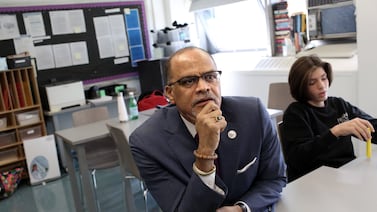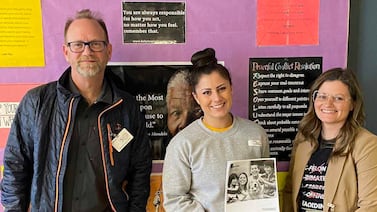Illinois lawmakers are debating competing proposals that would allow all Chicago voters to cast a ballot in the city’s first school board elections in 2024.
A new proposal put forward by House Democrats pairs up the 20 districts the city is currently divided into under a third draft map released last week.
That plan, filed by Rep. Ann Williams, who chairs the House Democrats’ Chicago Public Schools Districting Working Group, would result in 10 elected school board members and 10 appointed by the mayor from each pairing of districts. A school board president would also be appointed by the mayor.
Meanwhile, following a Senate executive committee meeting, Senate President Don Harmon put forward a plan to have all 20 districts vote in 2024 and let the mayor appoint only the school board president. That came shortly after a senate committee passed an amendment that suggested only 10 of 20 districts vote in 2024.
Harmon said creating an elected school board for Chicago has been “a long journey.”
“Hopefully, we are in the closing chapter in Springfield,” he said.
According to state law passed in 2021, Chicago will move from having a seven-member school board appointed by the mayor to a 21-member elected school board by 2027.
But the transition from an appointed board to a hybrid one to one that’s fully-elected has puzzled lawmakers tasked with dividing the city into electoral districts.
According to the law — and its subsequent trailer bill passed in 2021 — 10 school board members are to be elected on Nov. 5, 2024 from 10 geographic districts. The mayor is to appoint 10 members from those same districts and a school board president at-large. In November 2026, the appointed members would then switch to being elected, including the school board president who would be elected at-large.
By January 2027, all 21 members will be elected. Going forward, elections will be staggered, with half the board up for election every two years.
The senate’s previous proposal to assign each district a number and only have people living in odd-numbered districts vote in 2024 was met with criticism by advocates who spoke during Tuesday’s committee meeting.
Kurt Hilgendorf, special assistant to Chicago Teachers Union’s president Stacy Davis-Gates, said that while the senate’s plan proposes a more representative map and addresses concerns around candidate eligibility and ethics, the union has decided not to take a position because of the proposal to only allow roughly half of the city to vote in 2024.
“That creates a disenfranchisement lawsuit risk and that we think that maximum participation should be done in the first election,” said Hilgendorf. “We think that all the voters in the city of Chicago should have the right to vote in that first year election.”
Valerie Leonard, of Illinois African Americans for Equitable Redistricting, expressed the same concerns as Hilgendorf and suggested all 20 districts vote immediately.
“All districts should be up for election with half the terms being two-year terms and the other half being four years and that would create your stagger,” Leonard said.
At the end of Tuesday’s meeting, Harmon said having only 10 districts vote was the “Achilles’ heel” of the proposal Senate Democrats put forward late last week.
Shortly after the meeting ended, Harmon filed the amendment that would have residents in all 20 districts vote. Members elected in odd-numbered districts would serve four-year terms and members elected in even-numbered districts would serve two-year terms. The mayor would only appoint the school board president and in 2026, that position would be elected at-large by all Chicago voters.
If the House passes its new proposal to pair districts, it would need Senate approval. Similarly, the Senate’s proposal to have all 20 districts vote in 2024 would need House approval. Lawmakers are scheduled to be in session until Thursday.
Becky Vevea is the bureau chief for Chalkbeat Chicago. Contact Becky at bvevea@chalkbeat.org.
Samantha Smylie is the state education reporter for Chalkbeat Chicago covering school districts across the state, legislation, special education and the state board of education. Contact Samantha at ssmylie@chalkbeat.org.








